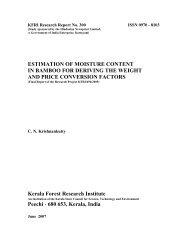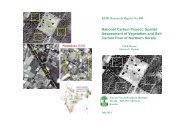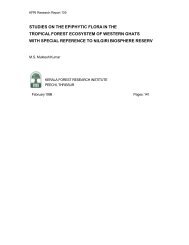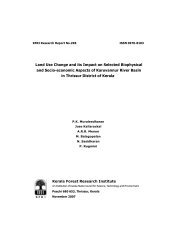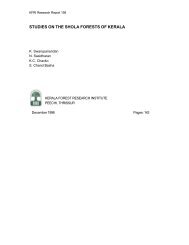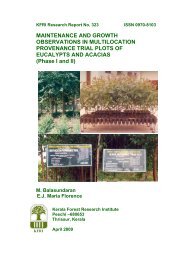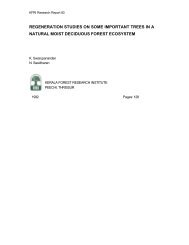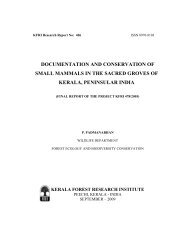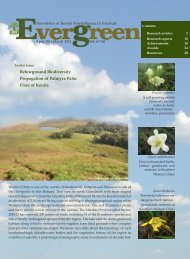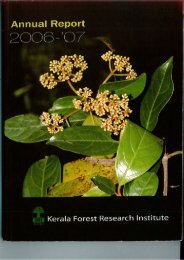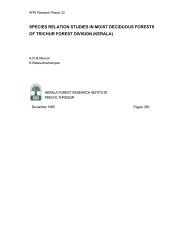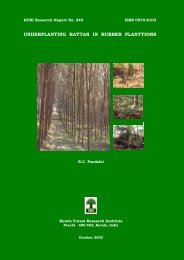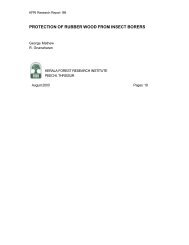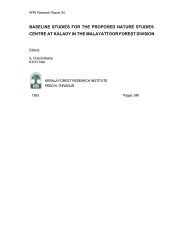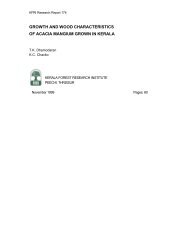2008-'09 - Kerala Forest Research Institute
2008-'09 - Kerala Forest Research Institute
2008-'09 - Kerala Forest Research Institute
Create successful ePaper yourself
Turn your PDF publications into a flip-book with our unique Google optimized e-Paper software.
Annual Report <strong>2008</strong>-09<br />
collaboration with the <strong>Kerala</strong> <strong>Forest</strong> Department. The seed centre has facilities for<br />
processing and storage of forest seeds.<br />
Seeds collected from different forest areas are dried, cleaned and graded before<br />
storage. The Centre has facility for low temperature storage of seeds. The seeds are<br />
tested, certified and supplied to <strong>Forest</strong> Departments and other stakeholders. At<br />
present seeds of only important forest trees such as teak and medicinal plants are<br />
supplied by the seed centre. It has plans to expand its stakeholder circle by meeting<br />
their demand for seeds of different forestry species.<br />
Tree Health Helpline<br />
KFRI has launched a Tree Health Helpline recently to attend to all queries related to tree<br />
planting and management like site selection, species site matching, planting, thinning, soil<br />
testing, fertilization, pest, disease and weed management, multi-species interactions, tree/<br />
wood sample identification, preservative treatment of wood and economic valuation of<br />
natural resources. The clientele of the service comprise the <strong>Kerala</strong> <strong>Forest</strong> Department,<br />
wood-based industries, other stakeholders, general public, students, private and public<br />
firms. A large number of queries are being attended to, problems diagnosed and remedies<br />
prescribed. Various Departments of KFRI like Soil Science, <strong>Forest</strong> Entomology, <strong>Forest</strong><br />
Pathology, <strong>Forest</strong> Physiology, <strong>Forest</strong> Botany, Silviculture, Wood Science, Statistics and<br />
Wildlife Biology are involved in the activity.<br />
Asia-Pacific <strong>Forest</strong> Invasive Species Network (APFISN)<br />
The office of the Asia-Pacific <strong>Forest</strong> Invasive Species Network (APFISN) is functioning<br />
at KFRI, Peechi under the coordinatorship of Dr. K.V. Sankaran, Director. The APFISN<br />
is a cooperative alliance of 33 member countries of the Asia-Pacific <strong>Forest</strong>ry Commission<br />
- a statutory body of the FAO. The Network focuses on inter-country cooperation that<br />
helps to detect, prevent, monitor, eradicate and/or control forest invasive species in the<br />
Asia-Pacific region. The main activities of the Network include: 1. Creating awareness of<br />
forest invasive species (FIS) throughout Asia-Pacific region, 2. Exchanging and sharing<br />
of information among member countries, 3. Facilitating access to technical expertise,<br />
research results, training and education, 4. Strengthening capacities of member countries<br />
to manage FIS and prevent new incursions, and 5. Developing strategies for regional<br />
cooperation and collaboration in combating FIS threats. The Network is supported by<br />
FAO and USDA <strong>Forest</strong> Service. The Network publishes a bi-monthly newsletter 'Invasives'<br />
and fact sheets on major invasive weeds and pests, which are intended to share information<br />
among the member countries on FIS and the threats they pose.<br />
TEAKNET Secretariat<br />
The Secretariat of TEAKNET- an international network of institutions and<br />
<strong>Kerala</strong> <strong>Forest</strong> <strong>Research</strong> <strong>Institute</strong><br />
7



